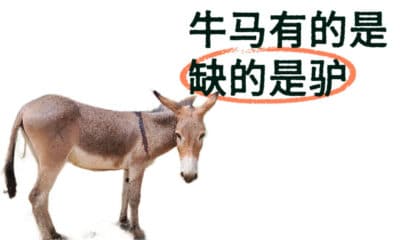China Brands, Marketing & Consumers
‘Carpet Pacific’: A Timeline of the Cathay Pacific Scandal Through Weibo Hashtags
Cathay Pacific flight attendants mocking non-English speaking passengers by saying, “If you can’t say blanket, you can’t have it,” has sparked a major controversy and caused a marketing catastrophe.
Published
2 years agoon
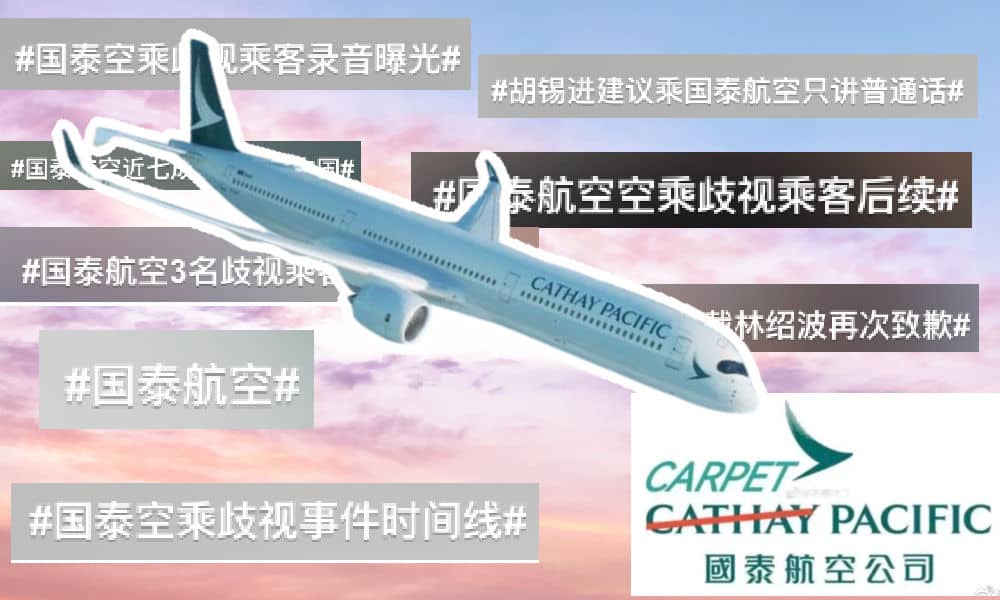
Last week, Xiamen Airlines was the focus of attention on Chinese social media after one of their pilots was caught secretly filming a female staff members in the ladies room. This week, the focus has shifted to Cathay Pacific, as the Hong Kong-based airline faced accusations of discrimination against travelers from mainland China.
The incident gained significant attention on May 22 when a user of the Xiaohongshu (Little Red Book) app shared a public complaint about the Hong Kong airline. In the post, the author, who claimed to have resided in Hong Kong for eleven years, expressed their inability to remain silent after witnessing overt discrimination on a Cathay Pacific CX987 flight from Chengdu to Hong Kong.
The passenger said they were seated near the area where the flight attendants rest and prepare meals, and that they could hear the cabin crew making fun of passengers who could not speak English. Passengers who tried to ask them for help in English about filling out immigration cards allegedly also received impatient responses. The passenger recorded some of their conversation, and later posted the audio clip online.
In one clip, you can hear the staff laughing about a passenger who wanted a blanket but could not properly say it in English. “If you cannot say blanket, you cannot have it,” they joked. Since some passengers allegedly had used the word ‘carpet’ instead of ‘blanket’, the cabin crew can be heard saying: “A carpet is on the floor.”
The biggest China social story of the past few days started with one passenger exposing Cathay cabin crew mocking & discriminating against non-English speaking (Mainland) passengers. His complaint and this 30 second audio snippet led to them being fired, and a social media storm. pic.twitter.com/BDuabQcm0S
— Manya Koetse (@manyapan) May 27, 2023
Since the incident was first exposed on social media, it turned into a major controversy and a marketing crisis for the Cathay Pacific company. As Cathay was condemned by million of netizens, many also vowed to boycott the airline.
Cathay Pacific has been hit hard by the pandemic, and was seeing an increased demand for travel into the Chinese Mainland since quarantine-free travel between Hong Kong the Mainland was finally resumed on January 8 of this year. Cathay is heavily dependent on the Chinese market, and approximately 70% of its revue reportedly comes from China (#国泰航空近七成营收来自中国#).
The incident has ignited anger due to the discriminatory treatment of mainland customers by a Hong Kong company, leading to further discussions on anti-Chinese sentiments in Hong Kong and the role of language in fostering (or hindering) national unity between mainland China and Hong Kong.
This is a timeline of the incident through Weibo hashtags that have gone trending over the past few days.
▶︎ The Cathay Discrimination Audio Leaked Online #国泰空乘歧视乘客录音曝光# (260 million views)
After a netizen posted about supposed discrimination against non-English speaking passengers by cabin crew members on the Cathay Pacific CX987 flight, the incident soon garnered widespread attention on Chinese social media, especially when the 30-second audio was also shared online (hear the audio snippet here).
▶︎ Cathay Pacific Apologizes #国泰航空致歉# (210 million views)
On May 22, Cathay Pacific soon issued a response apologizing for the passenger’s experience and promised a thorough investigation. However, their initial apology was considered inadequate by many netizens, and only sparked more debates about the discrimination against mainland Chinese passengers within Cathay’s work environment.
On May 23, Cathay Pacific issued a second apology via social channels, mentioning that they had contacted the passenger and that they had suspended the flight attendants involved.
▶︎ Cathay Pacific Uses Standard Mandarin to Apologize #国泰航空行政总裁用普通话道歉# (10 million views)

Lin Shaobo apologizes using Standard Mandarin, image via Weibo.com.
During a media briefing in Guangzhou on May 24, Cathay Pacific CEO Lin Shaobo (林绍波) once again expressed his sincere apologies on behalf of Cathay for the incident. In doing so, he used Standard Mandarin, the national language of mainland China.
▶︎ Three Employers Fired for Discriminating Against Passengers #国泰航空3名歧视乘客空乘被解聘# (460 million views)
At this time, it was also announced that Cathay had completed their investigation into the matter and, in accordance with the company’s regulations, had dismissed the three involved cabin crew members. Lin Shaobo clarified that the airline maintains a “zero tolerance” approach towards any employees who violate the company’s rules and ethical standards.
▶︎ Cathay Pacific’s Flight Attendant Union Regrets the Incident #国泰空乘工会对空姐被解聘感到遗憾# (180 million views)
On May 24, there was some online turmoil over a statement issued by Cathay Pacific’s Flight Attendant Union (FAU). In the statement, the union expressed that Cathay is “facing a shortage of both manpower and resources, a significant increase in workload and low salaries.” Because these problems are ignored, Cathay is seeing an “extremely low” morale among cabin crew and more complaints regarding cabin service. “Nothing comes from nothing,” the statement said. The Union was criticized for “whitewashing” the cabin crew’s discrimination against non-English-speakers.
▶︎ No Official Support for The Union #国泰航空称空中服务员工会不代表国泰# (130 million views)
On May 25, Cathay Pacific issued a statement in which they clarified that The Union is an independent labor union and does not represent the company. They also clarified that did not support the union’s position nor agreed with it.
▶︎ Hu Xijin Recommends Mainland Passengers to Speak Mandarin #胡锡进建议乘国泰航空只讲普通话# (910,000 views)
Chinese political & social commentator Hu Xijin (@胡锡进) also responded to the Cathay incident in multiple posts. In one of them, he suggested that mainland passengers should primarily speak Mandarin when they fly Cathay in the future. Since so much of their customer base is from mainland, Cathay should have enough cabin crew speaking Mandarin, he argued. Hu also reflected on how Cathay also caused controversy in 2019, when it would not stop staff from joining the Kong Kong pro-democracy protests. According to Hu, the company should pay attention to “correcting the values” of their employees.
▶︎”Leaked” Internal Email Labeled as Fake News #国泰航空称网传英文内部信件为伪造# (77 million views)
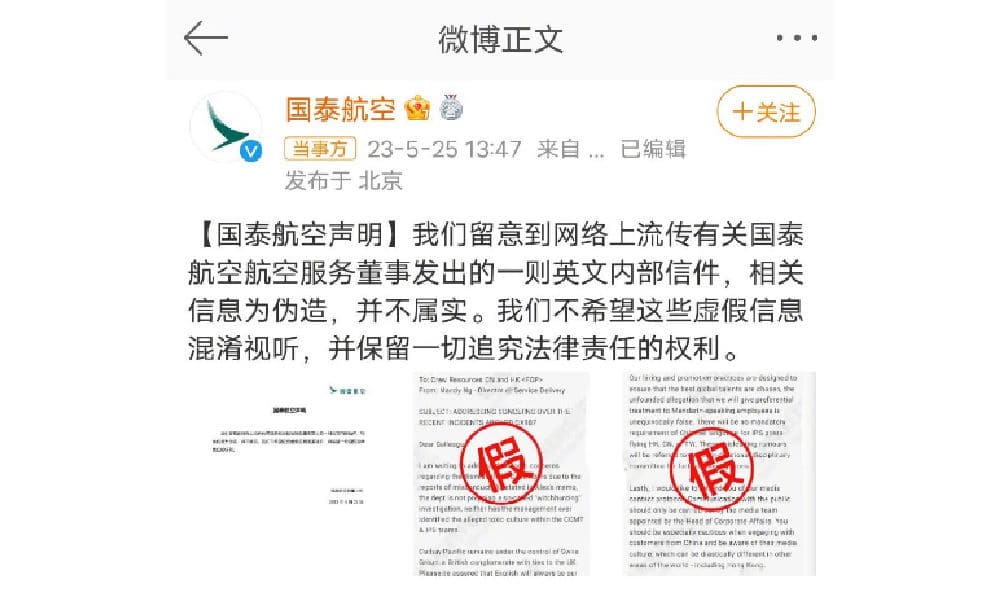
Post by Cathay in which they deny that this “leaked memo” is authentic. Screenshot by What’s on Weibo.
In the meantime, some images circulated online that allegedly showed an internal Cathay Pacific memo by the company’s HK Express CEO Mandy Ng in which a warning was issued to be “cautious when engaging with customers from China and be aware of their media culture.” That memo was labeled as being false by Cathay Pacific.
▶︎ Hong Kong Perfomer Condemns Cathay for Incident #香港演员怒斥国泰空乘歧视乘客# (170 million views)
Hong Kong celebrity Maria Cordero, nicknamed ‘Fat Mama’ (肥妈) went trending on Weibo for condemning the Cathay Pacific crew members in a recent interview. “Is speaking English that important?” she wondered: “The whole world is learning Chinese!” She also expressed that the primary duty of flight attendants is to look after passengers and help solve their problems. If they are incapable of fulfilling their duty, they should be sacked.
▶︎ Blankets for Everyone #旅客称现在国泰的航班挨个发毛毯# (6.5 million views)
According to passengers flying Cathay after the ‘blanket incident,’ the cabin crew went around explicitly asking all passengers if they needed any blankets, making announcements in English, Mandarin, and Cantonese.
▶︎ Follow-up to the Incident #国泰航空空乘歧视乘客后续# (26 million views)
As the Cathay scandal keeps fermenting online, one commenter expressed a common viewpoint by stating: “If Cathay Pacific is so unwilling to serve Chinese people and they refuse to speak Mandarin, why don’t they clearly state that they don’t welcome Chinese passengers? They can’t have it both ways by earning money from Chinese tickets without providing the same level of service.”
Meanwhile, an online meme has gained popularity, depicting ‘Cathay Pacific’ as ‘Carpet Pacific’ in reference to the controversial comments made by the cabin crew.
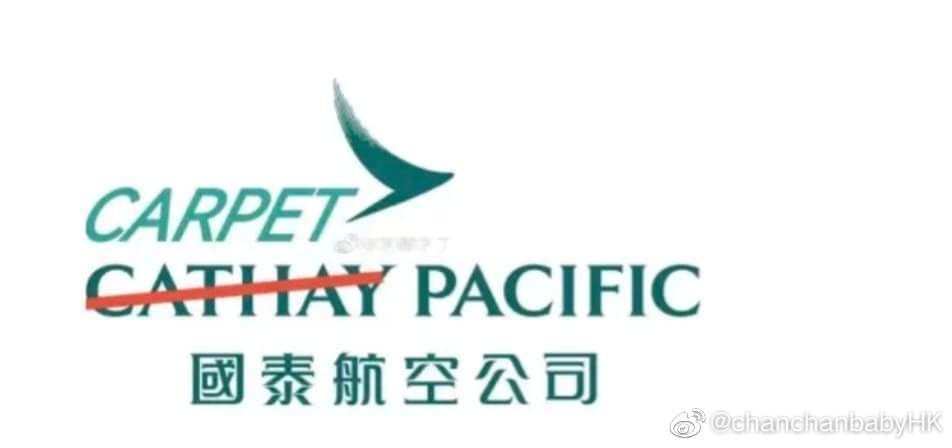
Other memes include the quote: “If you cannot say blanket, you cannot have it,” or include the phrase “no zuo no die” – a popular internet meme that basically means ‘what goes around comes around.’
Those flying China Southern Airlines or Eastern Airlines are posting about their warm on-board blankets, joking: “I didn’t even have to say ‘blanket’ and still got it!”
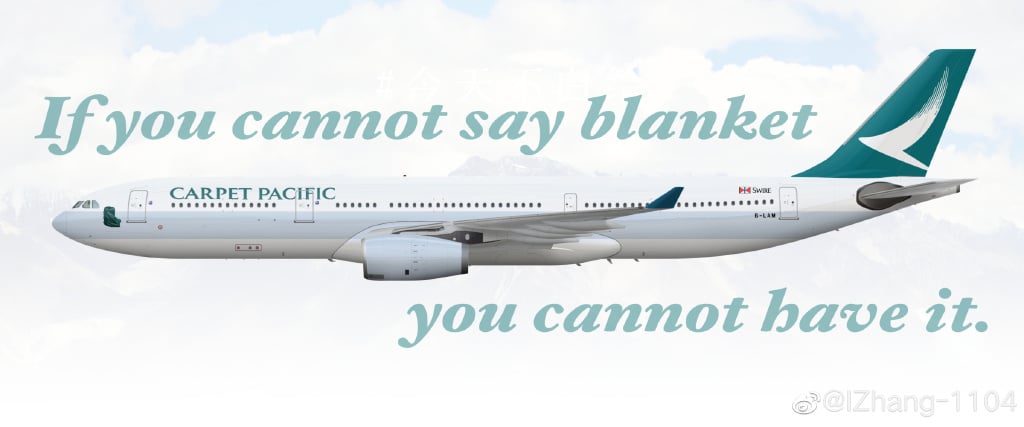
By Manya Koetse
Get the story behind the hashtag. Subscribe to What’s on Weibo here to receive our newsletter and get access to our latest articles:
Spotted a mistake or want to add something? Please let us know in comments below or email us. First-time commenters, please be patient – we will have to manually approve your comment before it appears.
©2023 Whatsonweibo. All rights reserved. Do not reproduce our content without permission – you can contact us at info@whatsonweibo.com.
Manya is the founder and editor-in-chief of What's on Weibo, offering independent analysis of social trends, online media, and digital culture in China for over a decade. Subscribe to gain access to content, including the Weibo Watch newsletter, which provides deeper insights into the China trends that matter. More about Manya at manyakoetse.com or follow on X.

You may like
China Animals
China Faces Unprecedented Donkey Shortage Crisis
“We have plenty of cattle and horses in China now — just not enough donkeys” (“目前我国牛马都不缺,就缺驴”).
Published
6 days agoon
October 5, 2025
China is facing a serious donkey shortage. China’s donkey population is far below market demand, and the prices of donkey-related products continue to rise.
Recently, this issue went trending on Weibo under hashtags such as “China Currently Faces a Donkey Crisis” (#我国正面临缺驴危机#).
The Donkey Branch of China’s Livestock Association (中国畜牧业协会驴业分会) addressed this issue in Chinese media earlier last week, telling China News Weekly (中国新闻周刊): “We have plenty of cattle and horses in China now — just not enough donkeys” (“目前我国牛马都不缺,就缺驴”).
China’s donkey population has plummeted by nearly 90% over the past decades, from 11.2 million in 1990 to just 1.46 million in 2023.
The massive drop is related to the modernization of China’s agricultural industry, in which the traditional role of donkeys as farming helpers — “tractors” — has diminished. As agricultural machines took over, donkeys lost their role in Chinese villages and were “laid off.”
Donkeys also reproduce slowly, and breeding them is less profitable than pigs or sheep, partly due to their small body size.
Since 2008, Africa has surpassed Asia as the world’s largest donkey-producing region. Over the years, China has increasingly relied on imports to meet its demand for donkey products, with only about 20–30% of the donkey meat on the market coming from domestic sources.
China’s demand for donkeys mostly consists of meat and hides. As for the meat — donkey meat is both popular and culturally relevant in China, especially in northern provinces, where you’ll find many donkey meat dishes, from burgers to soups to donkey meat hotpot (驴肉火锅).
However, the main driver of donkey demand is the need for hides used to produce Ejiao (阿胶) — a traditional Chinese medicine made by stewing and concentrating donkey skin. Demand for Ejiao has surged in recent years, fueling a booming industry.
China’s dwindling donkey population has contributed to widespread overhunting and illegal killings across Africa. In response, the African Union imposed a 15-year ban on donkey skin exports in February 2023 to protect the continent’s remaining donkey population.
As a result of China’s ongoing “donkey crisis,” you’ll see increased prices for donkey hides and Ejiao products, and oh, those “donkey meat burgers” you order in China might actually be horse meat nowadays. Many vendors have switched — some secretly so (although that is officially illegal).
Efforts are underway to reverse the trend, including breeding incentives in Gansu and large-scale farms in Inner Mongolia and Xinjiang.
China is also cooperating with Pakistan, one of the world’s top donkey-producing nations, and will invest $37 million in donkey breeding.
However, experts say the shortage is unlikely to be resolved in the short term.
The quote that was featured by China News Weekly — “We have cows and horses, but no donkeys” (“牛马有的是,就缺驴”) — has sparked viral discussion online, not just because of the actual crisis but also due to some wordplay in Chinese, with “cows and horses” (“牛马”) often referring to hardworking, obedient workers, while “donkey” (“驴”) is used to describe more stubborn and less willing-to-comply individuals.

Not only is this quote making the shortage a metaphor for modern workplace dynamics in China, it also reflects on the state media editor who dared to feature this as the main header for the article. One Weibo user wrote: “It’s easy to be a cow or a horse. But being a donkey takes courage.”
By Manya Koetse
(follow on X, LinkedIn, or Instagram)
Spotted a mistake or want to add something? Please let us know in comments below or email us. First-time commenters, please be patient – we will have to manually approve your comment before it appears.
©2025 Whatsonweibo. All rights reserved. Do not reproduce our content without permission – you can contact us at info@whatsonweibo.com.
China Arts & Entertainment
Passing the Torch from ‘Ne Zha’ to ‘Nobody’: China’s Box Office Poster Relay Tradition
With China’s box office relay tradition, every movie’s success becomes a win for Chinese cinema.
Published
2 months agoon
August 20, 2025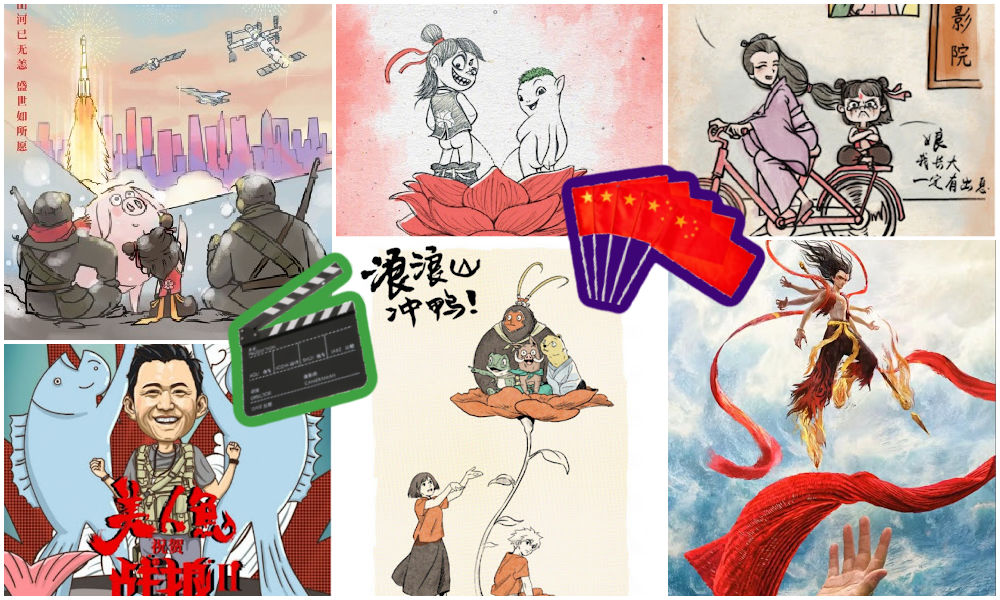
When one film breaks a record in China, the previous champion often celebrates with a playful and creative congratulatory poster. It’s a uniquely Chinese mix of solidarity, box-office success, and internet culture.
China’s 2025 summer box office season has been a success, surpassing 10 billion yuan (~US$1.4 billion), driven by record-breaking domestic films that have also made waves on Chinese social media.
Somewhat unexpectedly, the Chinese 2D animated feature Nobody (浪浪山小妖怪) has emerged as the season’s breakout hit.
On August 11, Nobody overtook the total earnings of the 2016 hit Big Fish & Begonia (大鱼海棠), also a domestically produced animation, becoming the highest-grossing domestic 2D animated film in Chinese history.
In keeping with industry tradition, Big Fish & Begonia celebrated the milestone by releasing a congratulatory poster on its official Weibo account.
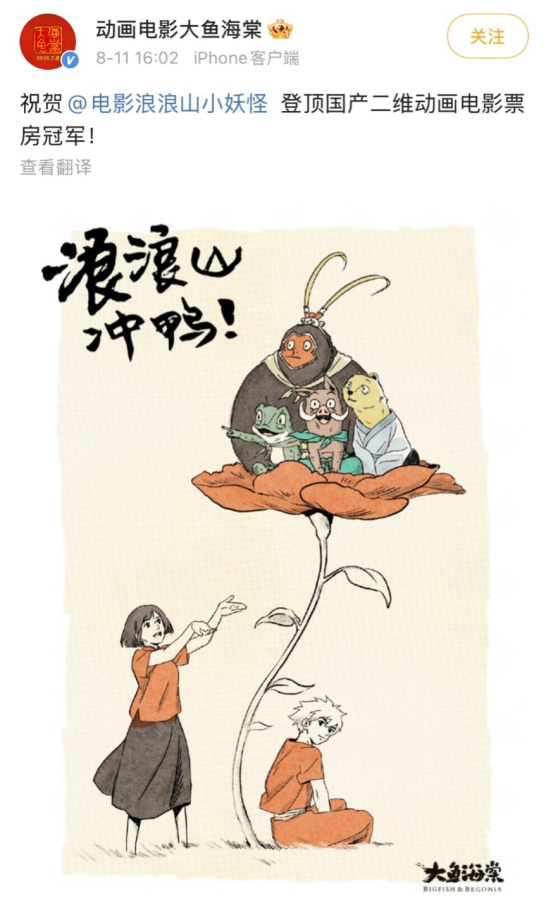
The poster shows the quirky characters of Nobody sitting on top of a giant red flower, while the protagonists of Big Fish & Begonia cheer them on from below. Written in bold calligraphy (“浪浪山冲鸭!”) is a playful phrase to cheer the movie on (translatable as: “Go, Langlang Mountain!” [Langlang Mountain is the original Chinese title.])
This is a unique “tradition” in China’s film industry: whenever a movie breaks a box-office record—no matter the category—the previous record-holder pays tribute by releasing a specially designed “congratulatory poster” in a gesture of camaraderie.
These posters are usually shared through the official Weibo accounts of the former champions, as it is common for Chinese film and TV drama productions to have their own accounts on Weibo.
Origins of the Poster Relay in China
The tradition of the so-called “box-office champion poster relay” (票房冠军海报接力) in China dates back to 2015, when Xu Zheng’s hit Lost in Thailand (泰囧)—which had held the record for highest-grossing domestic film since 2012 with a box office of 1.267 billion yuan (~US$200M)—was overtaken by Monster Hunt (捉妖记), which went on to gross 2.44 billion yuan (~US$340M).
Director Xu Zheng, who also starred in Lost in Thailand, took the initiative to release a humorous congratulatory poster for Monster Hunt. In the image, the little monster Huba (胡巴) is shown dancing on Xu’s bald head, accompanied by the text: “Lost in Thailand congratulates Monster Hunt on topping the Chinese box office.”

The poster that started a tradition.
Then, in 2016, Stephen Chow’s The Mermaid (美人鱼) surpassed Monster Hunt with a box office take of over 2.44 billion yuan (~US$340M). In response, the Monster Hunt team also released a congratulatory poster showing its main character Huba transformed into a mermaid, gazing up at the tail of The Mermaid.
The text on the poster reads: “Xing Ye (星爷) reaches the top, and Huba comes to congratulate him” — Xing Ye being Stephen Chow’s well-known nickname in Chinese. The vertical text on the right quoted lyrics from The Mermaid’s theme song: “You ask if this mountain is the highest in the world — there are always mountains higher than the other.”

Monster Hunt had been congratulated for its own win; now it was its turn to congratulate The Mermaid.
The relay continued in 2017 when Wolf Warrior 2 (战狼2) became the first Chinese film to cross the 5-billion-yuan mark (~US$700M), topping the chart. The Mermaid sent its congratulations with a poster featuring the Mermaid placing a crown on Wu Jing (吴京), the director and star of Wolf Warrior 2.

Caption: The Mermaid’s congratulatory poster for Wolf Warrior 2 in 2017. The text at the top reads: “When the nation is prosperous and the people are strong, the Mermaid shares in the honor.”
Beyond the Championship
Over time, the tradition expanded. Films that were overtaken in the rankings, even if it was not a change of the championship, also began releasing congratulatory posters.
In 2019, the animated sensation Ne Zha 1 (哪吒之魔童降世) surpassed a string of blockbusters, including Monster Hunt, Operation Red Sea (红海行动), and The Wandering Earth (流浪地球), to become the second-highest-grossing Chinese film at the time. Each of these films then sent their own tribute to “Little Nezha.”
A hand-drawn congratulatory poster by Xu Chengyi (许诚毅), the director of Monster Hunt, said: “We are all little monsters, free and easy together,” as a slight twist on Nezha’s classic line from the movie.
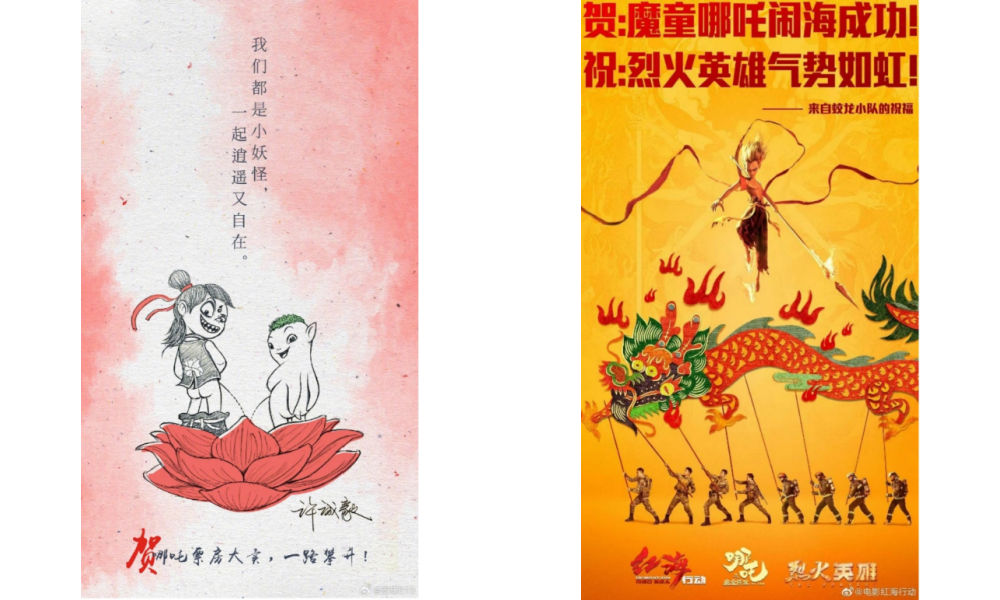
Congratulatory posters by Monster Hunt and Operation Red Sea to celebrate the success of Ne Zha in 2019.
The congratulatory poster by Operation Red Sea to Ne Zha 1 in 2019 also included a reference to The Bravest (烈火英雄), another film from the same producer, Bona Film Group, released at the same time as Ne Zha 1. In doing so, Bona used the popularity of Ne Zha 1 to promote its own new film at the same time.
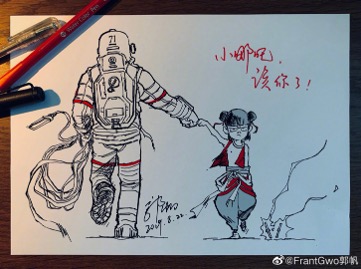
Congratulatory poster by Guo Fan(郭帆), director of The Wandering Earth.
In 2019, Guo Fan (郭帆), the director of The Wandering Earth (流浪地球), hand-drew a congratulatory poster for Ne Zha. The illustration featured playful artwork accompanied by the text: “Little Nezha, now it’s your turn!”
Ne Zha also set a milestone for Chinese animation in an international context, earning 1.834 billion yuan (~US$260M) within nine days and reclaiming the animated film box office record in China from Zootopia.
Coloroom Pictures, the producer of Ne Zha and other Chinese animated hits, marked the achievement with a poster that both celebrated the unity of China’s animation community and acknowledged the challenges that still lay ahead, writing: “Chinese animation has taken a big step forward, but it is still just starting out.”
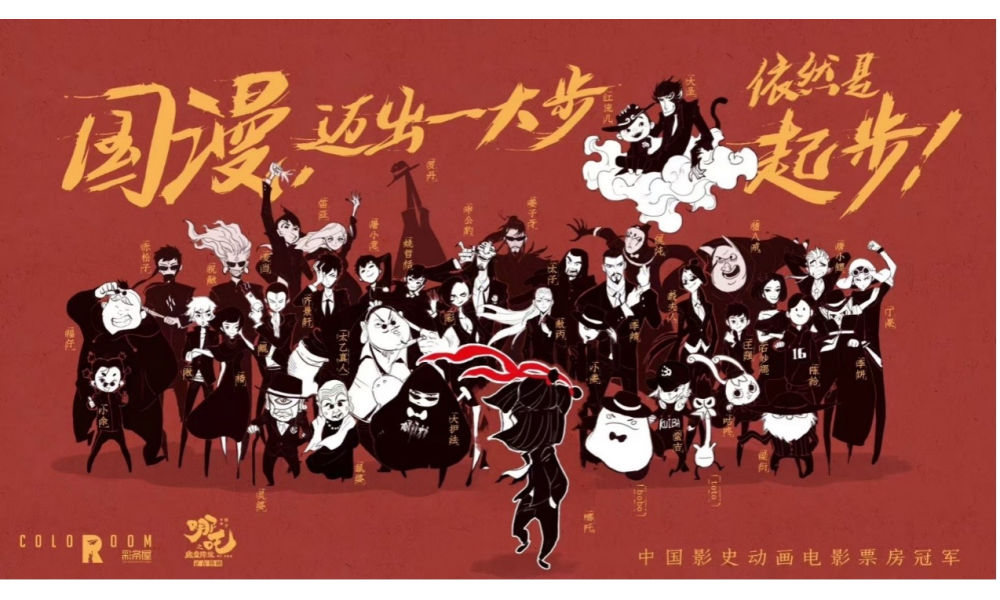
The poster features dozens of Chinese anime characters in formal dress, with Little Nezha standing in front of them and looking back.
These kinds of online congratulatory wishes, resonating with netizens, continued in 2021 when Hi, Mom (你好,李焕英) climbed to second place in China’s all-time box office.
Ne Zha 1 then released a hand-drawn poster showing Nezha sitting on the back of his mother’s bicycle, vowing to make something of himself—a promise fulfilled four years later when Ne Zha 2 actually surpassed Hi, Mom in early 2025.

Ne Zha 1’s congratulatory poster to Hi, Mom in 2021. The poster depicted a scene in front of Chentangguan Cinema where Hi, Mom is being shown, with Nezha sitting on the back seat of his mother’s bicycle (a classic scene in Hi, Mom’s promotion poster), vowing, “Mom, I will surely make something of myself when I grow up.”
In return, Hi, Mom published a poster in a matching style to response Ne Zha’s congratulatory poster in 2021.
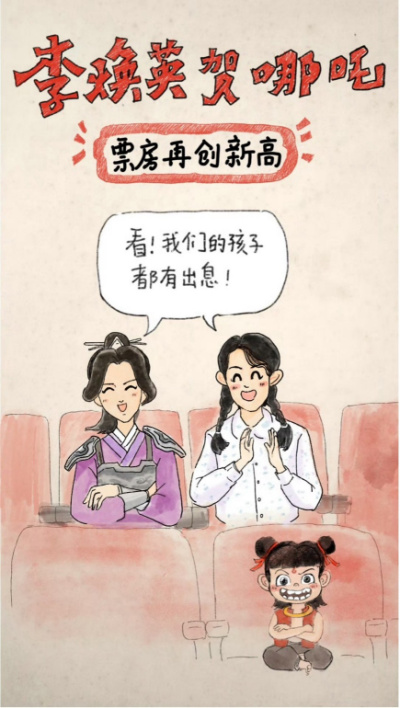
Hi, Mom’s congratulatory poster to Ne Zha 2 in 2025, in which Nezha’s mother and the mother from Hi, Mom sitting together and applauding for the success of Ne Zha 2, saying, “Look! Our children are all promising.”]
All these exchanges have created unexpected interactions between vastly different movie genres.
In November 2021, when the war epic The Battle at Lake Changjin (长津湖) surpassed Chinese animation feature Ne Zha 1, the congratulatory poster released by Ne Zha 1 depicted Nezha alongside volunteer army soldiers, gazing at rockets, fighter jets, and satellites.
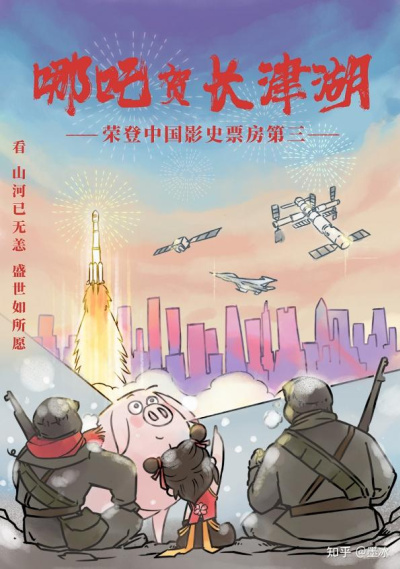
Ne Zha 1’s congratulatory poster to The Battle at Lake Changjin in 2021.
In 2025, when Ne Zha 2 seized the all-time box-office crown, The Battle at Lake Changjin also responded with a creative image.
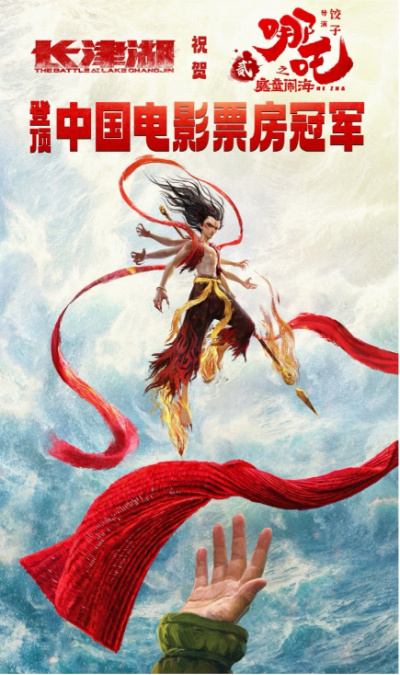
The Battle at Lake Changjin’s congratulatory poster to Ne Zha 2 in 2025.
In that image, Nezha’s magical weapon the Hun Tian Ling (混天绫) was ingeniously linked to the red scarf thrown to soldiers in The Battle at Lake Changjin. At the bottom, a soldier’s large hand is shown in a lifting gesture, holding Nezha up.
The concept of such a serious war movie interacting with a humorous animated film sparked some excitement among Chinese netizens at the time. They saw the exchange as a dialogue between traditional mythology and modern history, and as a symbol of the continuity and success of China’s film industry.
A Unique Chinese Tradition?
The custom of one film “passing on the torch” to the next hit film through a congratulatory message is not entirely unique to China. The practice can actually be traced back to Hollywood.
In 1977, when Star Wars dethroned Jaws at the North American box office, director Steven Spielberg congratulated George Lucas with a full-page ad in Variety, humorously depicting R2-D2 reeling in the great white shark.

When Star Wars was dethroned by Titanic at the global box office in 1998, George Lucas sent a famous congratulatory message to James Cameron, again as a full-page ad in Variety.

Star Wars meets Titanic, famous congratulatory message to James Cameron .
In May 2019, when Avengers: Endgame officially overtook Titanic’s worldwide box office total to become the second-highest-grossing film of all time (behind Avatar), James Cameron — director of both Titanic (1997) and Avatar (2009) — posted a congratulatory image to salute Marvel Studios.

James Cameron on Twitter in May 2019.
So, although the practice of “passing the torch” among box office record-holders is not uniquely Chinese, the way it has developed in China is very distinct:
🔹 In Hollywood, box-office champions often hold the crown for years, and the ‘changing of the guards’ is relatively rare. In China, however, the industry has flourished mainly in the past decade, and records are broken far more frequently.
🔹 Social media has become central to promotion and marketing. Virtually all major Chinese films run active official accounts that not only post promotional material but also engage in playful interactions with other productions.
🔹 In Hollywood, congratulatory notes tend to come from individual directors, who salute each other as “friendly competitors.” In China, the messages are sent from the films’ official accounts, presenting it more as team-to-team recognition.
🔹 In that sense, it’s not just “movie versus movie,” but rather the Chinese film industry collectively measuring itself against Hollywood and other foreign hits. Each congratulatory poster is therefore not only a celebration of a new record, but also a statement of pride in the broader success of Chinese cinema.
🔹 Participation is not limited to the very top box-office leaders; other productions often join in, creating a ripple effect of collective celebration.
In China, the frequent turnover of box-office leaders combined with the creativity of these posters has turned the practice into a beloved feature of both film culture and the social media landscape.
In an earlier online poll, a majority of respondents described the tradition as “encouraging, and a demonstration of solidarity in China’s film industry.” Others called it a form of “romantic etiquette” unique to Chinese cinema.
Most importantly, it simply feels good — a win-win for both older and newer productions. As one netizen wrote after seeing the congratulatory artwork from Big Fish & Begonia’s official account: “I was inspired and hope that these little monsters can give everyone the courage to set out on their journeys, as well as the strength and passion to pursue their dreams. I hope domestic animation will keep getting better and better!”
By Wendy Huang
Edited by Manya Koetse
Spotted a mistake or want to add something? Please let us know in comments below or email us. Please note that your comment below will need to be manually approved if you’re a first-time poster here.
©2025 Whatsonweibo. All rights reserved. Do not reproduce our content without permission – you can contact us at
info@whatsonweibo.com
Subscribe
What’s on Weibo is a reader-supported publication, run by Manya Koetse (@manyapan), offering independent analysis of social trends in China for over a decade. To receive new posts and support our work, consider becoming a paid subscriber.

Get in touch
Would you like to become a contributor, or do you have any tips or suggestions? Get in touch here!

China Faces Unprecedented Donkey Shortage Crisis

Nanchang Crowd Confuses Fan for Knife — Man Kicked Down and Taken Away

The Wong Kar-wai Scandal Explained: The Dark Side of ‘Blossoms Shanghai’

China’s National Day Holiday Hit: Jingdezhen’s “Chicken Chop Bro”

Evil Unbound (731): How a Chinese Anti-Japanese War Film Backfired

Hidden Cameras and Taboo Topics: The Many Layers of the “Nanjing Sister Hong” Scandal

“Jiangyou Bullying Incident”: From Online Outrage to Offline Protest

The Rising Online Movement for Smoke-Free Public Spaces in China

China Trend Watch: Pagoda Fruit Backlash, Tiananmen Parade Drill & Alipay Outage (Aug 11–12)

From Schadenfreude to Sympathy: Chinese Online Reactions to Charlie Kirk Shooting
Popular Reads
-

 China Memes & Viral3 months ago
China Memes & Viral3 months agoHidden Cameras and Taboo Topics: The Many Layers of the “Nanjing Sister Hong” Scandal
-

 China Books & Literature11 months ago
China Books & Literature11 months agoThe Price of Writing Smut: Inside China’s Crackdown on Erotic Fiction
-

 China Insight5 months ago
China Insight5 months agoUnderstanding the Dr. Xiao Medical Scandal
-

 China Memes & Viral9 months ago
China Memes & Viral9 months agoOur Picks: Top 10 Chinese Buzzwords and Phrases of 2024 Explained

